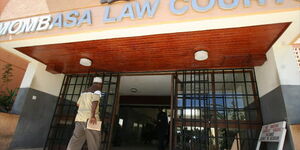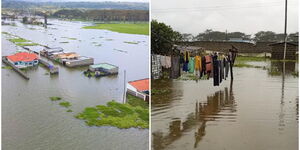National Environment Management Authority (NEMA) Director General Geoffrey Wahungu on Tuesday moved to court to stop his arrest and prosecution over the Solai dam tragedy.
His move comes after a Senate committee found the environmental body, among other parties, culpable for the tragedy that claimed 52 lives.
Committee Chairman, Senator Mutula Kilonzo Jr stated that NEMA, the owner of the dam Perry Mansukh and Water Resources Management Authority (WRMA) now WRA should be held culpable for the May 9 incident.
[caption caption="National Environment Managment Authority (NEMA) Director General Geoffrey Wahungu"] [/caption]
[/caption]
The Mutula-led committee found that lack of action from officials of the two government agencies directly contributed to the tragedy that ensued after the walls of the dam collapsed.
"The dam had no license, a matter that was allegedly covered up by WARMA and NEMA. Furthermore, NEMA had not inspected the dam since 2005 for the danger posed by the water diverted from a river into the dam," the report stated.
[caption caption="Senator Mutula Kilonzo Jr"] [/caption]
[/caption]
Mutula reported that the killer dam had been built at 1,694 meters above the sea with a 30-meter long mud wall holding 300 million litres of water with no spill-out.
The committee also recommended severe punishment be meted out to Mansukh "to serve as an example to other people taking the lives of Kenyans for a ride."
As part of the compensation, the senators added that the dam owner should cede part of the 3,250-acre farmland for use in resettling the affected families.
"Mr Mansukh has 3,250 acres of land out of which 800 acres hold a wildlife sanctuary. We cannot be having an investor who treats Kenyans worse than his animals," Kilonzo stated.
Similarly, a report by the Kenya Human Rights Commission (KHRC), blamed government agencies tasked with managing water resources and the environment and farm’s management for the tragedy that killed innocent residents.
“Our findings established that the construction of dams during the colonial and post-colonial period was done haphazardly at best. Most of the dams, including those in Solai, were built without community participation and little consideration was given to the needs of the surrounding communities who rely on agriculture as a means of livelihood.
"Little attention was given to social and environmental protocols when building the dams and priority was given to immediate and egocentric needs for the political elites over those of future generations and ecosystems,” the report titled, Damned Dams: Exposing Corporate and State Impunity in the Solai Tragedy stated in part.
[caption caption="Scenes after Solai Dam Walls collapsed "] [/caption]
[/caption]












